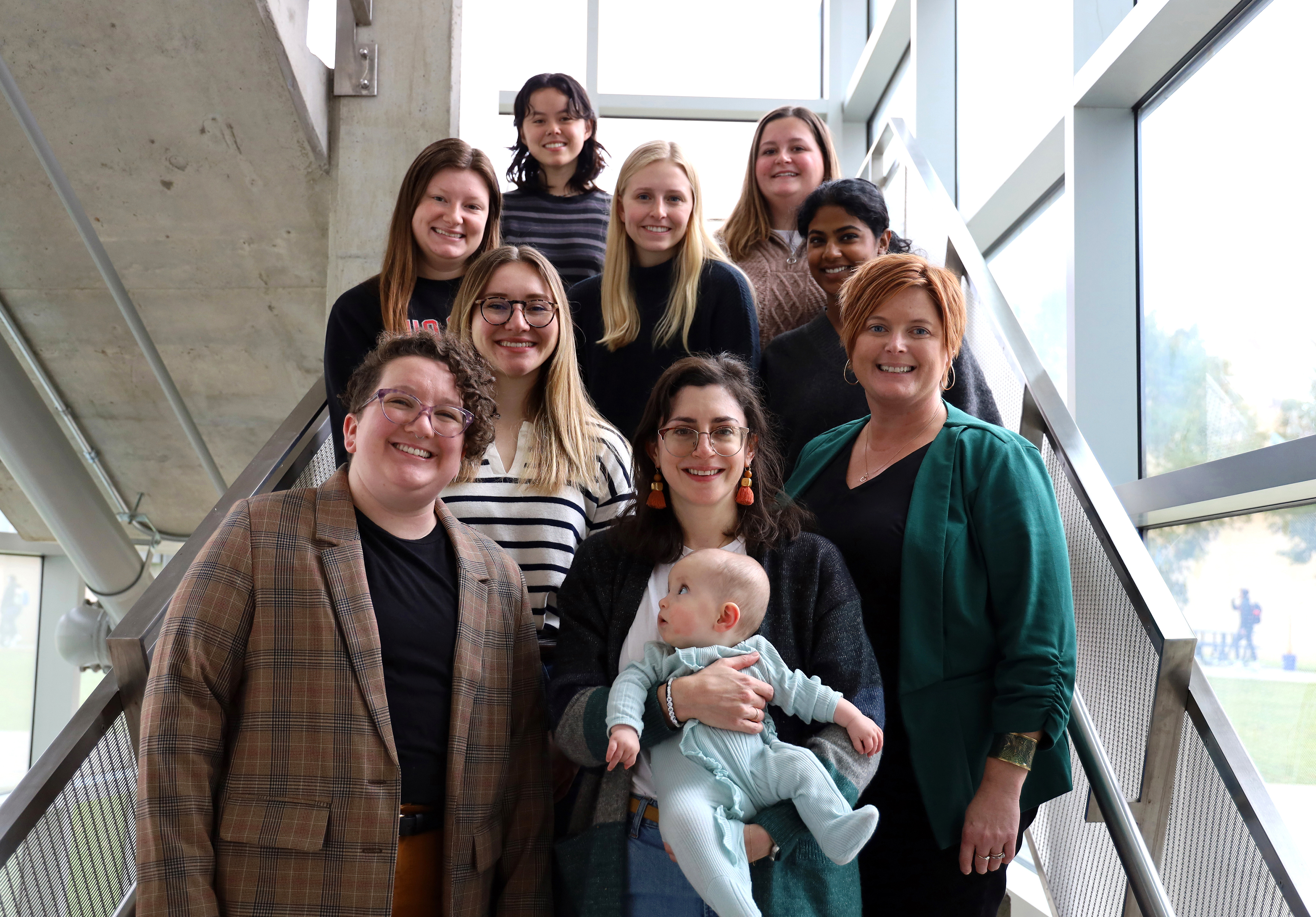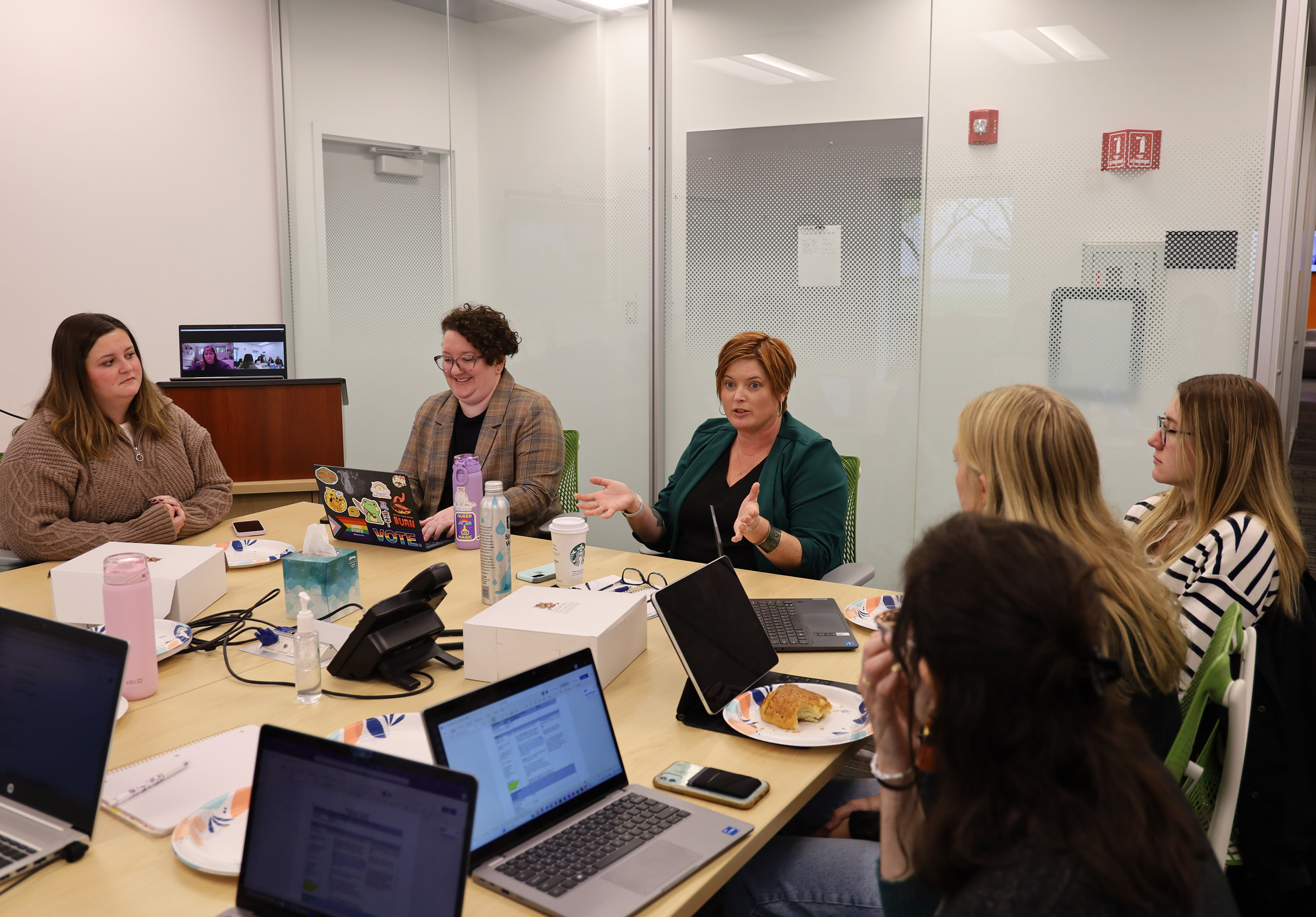Students shine in LGBTQ+ health equity lab
Teamwork, support core to Joanne Patterson’s research group
By Kristen Mitchell

On the first Friday after a large tobacco regulatory conference in Bethesda, Maryland, Assistant Professor Joanne Patterson assembled what she calls her “dream team” to debrief.
MPH-epidemiology students Emma Jankowski and Ashley Meadows, both researchers in Patterson’s Practice and Science for LGBTQ+ Health Equity research collaborative, shared the types of questions they were asked while presenting posters on their work, passed on insights about what they learned and encouraged their fellow students to seize opportunities to share their research more broadly.
This type of support and collaboration is common for the tight-knit crew.
“They’re such a great productive team,” Patterson said. “I truly wouldn’t be able to do a tenth of the work we’re doing right now without them.”
Patterson’s lab evaluates the effectiveness and implementation of culturally tailored interventions to reduce behavioral cancer risks among minoritized lesbian, gay, bisexual, transgender and queer (LGBTQ+) populations, especially youth. She works closely with staff researchers and a team of eight master’s and undergraduate student researchers who assist with ongoing research and bring forward their own ideas.
Since joining the team as an undergraduate student last year, Jankowski said she’s gotten to do “a little bit of everything.” From working on statistical analysis to drafting an academic paper, the hands-on research opportunities on Patterson’s team have been “irreplicable,” she said.
“It’s not just about how I can best serve the lab, but how this experience can best serve me, which has been awesome,” Jankowski said. “I always knew I wanted to go into research…but (working in the lab) helped me feel more confident that I have the skills to do that. It helps me hone the skills that I’ll need going forward.”

Jankowski had the opportunity to lead several focus groups with LGBTQ+ youth as part of a project focused on nicotine, vaping and tobacco messaging and marketing. The team found that participants, primarily between ages 20 and 28, were more forthcoming with student facilitators, which led to insightful casual conversations about the visual materials.
The students took those findings back to their weekly team meeting where they discussed the cultural context around sentiments — unpacking, for example, exactly what it means to call an advertisement “very Glee,” Patterson said. (For the uninitiated, Glee is a network TV show about a high school glee club that aired between 2009 and 2015. You had to be there).
At the tobacco regulatory conference, Jankowski presented her analysis of factors that motivate individuals to smoke and whether there is a difference for LGBTQ+ and heterosexual people. Patterson and Research Associate Alysha Caine Ennis also spoke about the lab’s work during a health equity symposium.
Meadows, who joined the lab last year, said she enjoys being able to take knowledge from the classroom and implement it in the lab, and vice versa. The collaborative team culture also makes it a place to ask questions and brainstorm ideas.
“When you are researching, there are going to be some areas where you are not understanding or have a limited scope of knowledge,” she said. “We all bounce ideas off each other, and that’s been super helpful.”
Junior Sydney Galusha said she’s gained a deeper understanding of health inequalities since joining the lab last year and digging into literature reviews — introducing meaningful background information for her public health sociology classes. Galusha plans to go to medical school and hopes what she’s learning now will help make her a compassionate clinician in the future.
Working alongside and learning from graduate students has also been an enriching experience, she said.
“This lab is so welcoming, caring and motivated. It’s just really amazing to work with everyone,” she said. “Joanne has shown me how to be a really good leader.”
Patterson encourages students to bring their own perspectives to the lab when they talk about research ideas or challenges in an ongoing project, whether it’s informed by their experiences living with a marginalized identity or their coursework outside of public health.
“They’re starting to give each other advice or asking questions about the analyses or the interpretation of them…it tells me they’re feeling their feet underneath them,” she said. “That’s the place I’m excited to build this with them.”